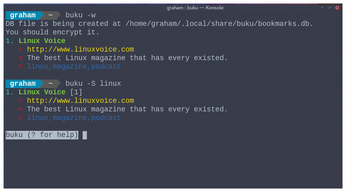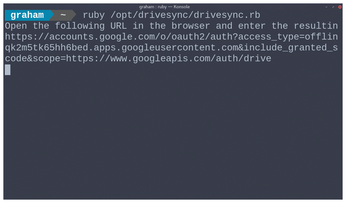FOSSPicks
Buku
Bookmark managers, where you store the title and location of your favorite web destinations, are a little like password managers. We all used to trust online services and applications to hold our secret links, but with the changing times, many of us have changed our processes. Some of the best password managers are now operated from the command line, with new ones appearing every month, and it's a similar story with bookmark managers. Keeping your bookmarks local and in a single place, where any files can then be versioned with git or encrypted via GnuPG, gives you the kind of control you don't get with Firefox, Chrome, or any one of the bookmark add-ons designed for specific browsers. Storing your bookmarks locally is what Buku does; it's a simple bookmark manager that hopes to put everything you need at your fingertips.
With Buku installed, the easiest way to invoke its functionality is to enter buku -w, which will open a simple template with your favorite text editor (e.g., Vim), with empty lines left for adding your URL, a title for the URL, tags, and any comments. This sounds more cumbersome than it really is, because it only takes a simple Paste and Save if you want to record a bookmark. It's a quicker process than doing the same thing from a browser, especially if you're already on the command line. You can perform the same function with arguments too, obviating the need for an editor completely. Tags are used with the internal search, which is a great way of retrieving your Linux-related bookmarks, for instance. You can then sync bookmarks with a web service, export them to HTML, or create scripts for your clipboard or for talking directly to your favorite browser.
Project Website

Google drive synchronization
DriveSync
In many ways, it's remarkable that Google has yet to provide an official client for accessing its cloud filesystem; although, it may well be a blessing in disguise. A Google client may well collect more metrics, silently sync them to its servers, and be unlikely to be open source, making it less convenient, less privacy-conscious, and less easy to distribute. Perhaps this is why one hasn't been created. Credit goes to Google for tolerating the many third-party utilities that have come and gone over the years, most notably the desktop integration that pushes a local folder to your cloud storage. Having Google Drive integration is still worth the effort, though, even with the privacy and proprietary issues, because many of us now collaborate with colleagues in Google Docs, and it's the way many remote workers need to work.
DriveSync is one of the best. It's small, unobtrusive, and efficient, and it slots perfectly into the Linux way of doing things. Installation is via a git clone and execution of the Ruby bundle command. With that done, you simply need to edit a configuration file. Arch users will have the location of this file pointed out to them during installation (/opt/drivesync/config.yml). This allows you to change the local drive folder and change settings, such as whether locally deleted files will also be deleted remotely. Authentication is handled by running the command first, giving you a URL to which to point a browser. Finally, with that working, you need to add
*/1 * * * * ruby /opt/drivesync/drivesync.rb
to your crontab, which will take care of the synchronization process by running drivesync.rb every minute. With the process running, files will automatically be configured according to your configuration, and you won't have to worry about Google releasing an official client.
Project Website
https://github.com/MStadlmeier/drivesync

Buy this article as PDF
(incl. VAT)
Buy Linux Magazine
Subscribe to our Linux Newsletters
Find Linux and Open Source Jobs
Subscribe to our ADMIN Newsletters
Support Our Work
Linux Magazine content is made possible with support from readers like you. Please consider contributing when you’ve found an article to be beneficial.

News
-
Canonical Releases Ubuntu 24.04
After a brief pause because of the XZ vulnerability, Ubuntu 24.04 is now available for install.
-
Linux Servers Targeted by Akira Ransomware
A group of bad actors who have already extorted $42 million have their sights set on the Linux platform.
-
TUXEDO Computers Unveils Linux Laptop Featuring AMD Ryzen CPU
This latest release is the first laptop to include the new CPU from Ryzen and Linux preinstalled.
-
XZ Gets the All-Clear
The back door xz vulnerability has been officially reverted for Fedora 40 and versions 38 and 39 were never affected.
-
Canonical Collaborates with Qualcomm on New Venture
This new joint effort is geared toward bringing Ubuntu and Ubuntu Core to Qualcomm-powered devices.
-
Kodi 21.0 Open-Source Entertainment Hub Released
After a year of development, the award-winning Kodi cross-platform, media center software is now available with many new additions and improvements.
-
Linux Usage Increases in Two Key Areas
If market share is your thing, you'll be happy to know that Linux is on the rise in two areas that, if they keep climbing, could have serious meaning for Linux's future.
-
Vulnerability Discovered in xz Libraries
An urgent alert for Fedora 40 has been posted and users should pay attention.
-
Canonical Bumps LTS Support to 12 years
If you're worried that your Ubuntu LTS release won't be supported long enough to last, Canonical has a surprise for you in the form of 12 years of security coverage.
-
Fedora 40 Beta Released Soon
With the official release of Fedora 40 coming in April, it's almost time to download the beta and see what's new.

